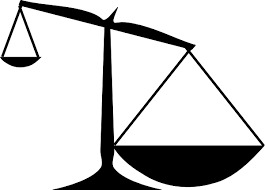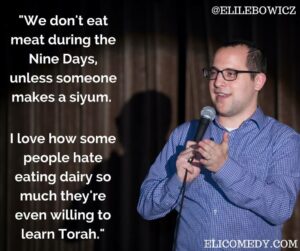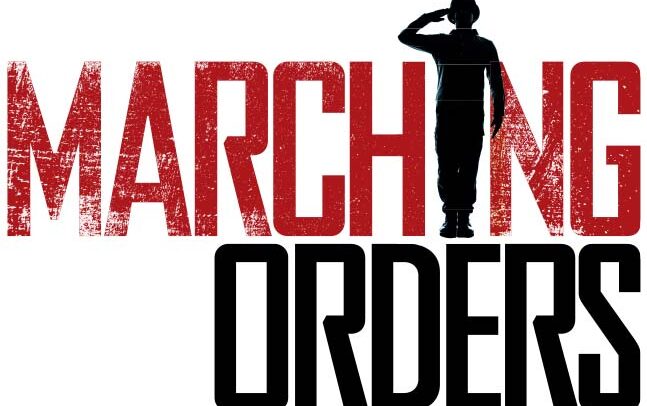Marching Orders:
Raboyseyee and Ladies,
Welcome to Sefer and Parshas Devorim and let’s quickly say hello to Eisav and to Loit. Hello to who? Didn’t we say our goodbyes to both these gentlemen back in Sefer Bereishis? Aren’t they long dead? Indeed they are. Were they again mentioned or heard from since? Not! What are they doing in our parsha? What do these two gentlemen have in common? Were they in fact worthy of the moniker ‘gentlemen’? Or, were they bad guys? We shall explore these and other questions about Eisav and Loit but let’s begin with this admission: it’s not Eisav that’s shouted out -he’ still dead- but his descendants who garner five different mentions in five different pisukim, all in one perek this week. Impressive! Loit’s descendants too are shouted out; they get but two; also not terrible. It’s likely the case that most of you skipped over this factoid over the many years you have heard this parsha being read. More on them and why they appear soon.

Ershtens (firstly), a shtikel shout out to the heylige Ois upon the completion -with this week’s parsha post- of his 12th year of uninterrupted writings. Mamish amazing! What began with one reader and a one-time devar-Torah back on Parshas Vo’eschanan over in the Westhampton Beach has mushroomed and today you can find kimat all the Ois has written on the burgeoning website. Check it out www.oisvorfer.com. A few posts, those written in 2010 are missing. Those have disappeared with some version of the Blackberry, olov hashlom, (may it and they rest in peace). Let’s also shout out chaver Mike Kogan, whose idea it was to create the site and for volunteering to host and maintain it all these years.
 Shoin, we’re in the week of Tishe Be’ov, or are we? In theory Tishe Be’ov falls on the heylige shabbis this year; in reality, because it does fall on shabbis, its observance is pushed off to Sunday and therefore the kasha (question) taka is azoy: are we in the week of Tishe Be’ov or not? Because many Sephardim observe nine-day restrictions only in the week that Tishe Be’ov falls, that question does have implications for them and those who become Sephardic yearly during the three weeks and for three weeks only. That question notwithstanding, and as we get ready to observe Tishe Be’ov one day late this coming Sunday, many are already wondering how the day will be spent. How to kill the day? The bottom line: most will be watching baseball, Netflix (other streamers), a new or old movie, napping a few hours, and a few will bury themselves in a good book.
Shoin, we’re in the week of Tishe Be’ov, or are we? In theory Tishe Be’ov falls on the heylige shabbis this year; in reality, because it does fall on shabbis, its observance is pushed off to Sunday and therefore the kasha (question) taka is azoy: are we in the week of Tishe Be’ov or not? Because many Sephardim observe nine-day restrictions only in the week that Tishe Be’ov falls, that question does have implications for them and those who become Sephardic yearly during the three weeks and for three weeks only. That question notwithstanding, and as we get ready to observe Tishe Be’ov one day late this coming Sunday, many are already wondering how the day will be spent. How to kill the day? The bottom line: most will be watching baseball, Netflix (other streamers), a new or old movie, napping a few hours, and a few will bury themselves in a good book.

One thing is zicher: few the Ois knows will be learning and reading about the destruction of the Temples -both of them- we mourn on this day. Is this what our sages had in mind when they declared a fast day? And when they declared three weeks of lifestyle restrictions? Mistama not, but that’s the reality over 1900 years later. Time heals most wounds and 1952 years later, it’s hard to get into the proper frame of mind. Shoin, I said it! As an aside, exactly when the second Temple was destroyed is the subject of some debate, but all agree that it was destroyed in either 3828, 3829, or 3830. When was that? A long time ago. The good news: Yom Kippur is fast approaching and compared to your other sins, improper motivation on Tishe Be’ov won’t even register. Veyter.
According to most, all of Devorim takes place in Moishe’s last 35 days. Previously informed that he too would die in the midbar, he’s now busy teaching the last 200 or so new mitzvis. In early editions of the Art Scroll Stone Chumash, they told us that Sefer Devorim has but 50 new commandments. That number was upgraded some years back when one or more gentleman protested and convinced them the number was much larger. Today in 2022, the number stands near 200. Aside from teaching new commandments, Moishe is also delivering long orations, ober let’s get back to Eisav and Loit and find out why they are mentioned by Moishe in the first of his final speeches before passing away. Eisav and Loit are indeed back. They are because of what we read about them and the Ois is here to declare -efsher controversially -as he many times in the past- that these two gentlemen- though lambasted by the medrish and heylige Gemora- were not bad guys. Certainly, not rotten to the core. Farkert: the Ois is suggesting that both were decent guys. One can argue that both were flawed; then again, who amongst us isn’t? In fact, those making the most noise while complaining about others, are typically the most flawed of all. But bad? Evil? Are they deserving of the many nasty things said about them in the medrish and elsewhere? Or, should we remember them kindly and not as villainous individuals? We shall explore this topic for the very first time and the Ois admits that very little is written in support of the Ois’s theory but stay with me; you decide.
As Parshas Devorim opens Moishe is delivering the first of his three soliloquies and is retelling (also revising) the history of the Yiddin for the past forty years. In the second perek (chapter), the Yiddin are getting their marching orders. Moishe is getting them ready to cross the Jordan River, where they are to begin conquering the land promised to them. They are getting ready to battle the inhabitants of the land promised. This is where it gets very interesting. The Yiddin are prevented from attacking Edom, Amon and Moiav. It appears that by divine decree, the RBSO has awarded specific inheritances to these nations; ancestral land, the Yiddin are barred from these lands. The Yiddin cannot rape, pillage or treat these countries and their countrymen poorly. No chapping of the women as booty and more: no drinking the water and or stealing their food. If the Yiddin want anything, they must pay; retail! Let us read the pisukim (Devorim 2:2-8) innaveynig:
וַיֹּאמֶר יְהוָה אֵלַי לֵאמֹר. ג רַב לָכֶם סֹב אֶת הָהָר הַזֶּה פְּנוּ לָכֶם צָפֹנָה. ד וְאֶת הָעָם צַו לֵאמֹר אַתֶּם עֹבְרִים בִּגְבוּל אֲחֵיכֶם בְּנֵי עֵשָׂו הַיֹּשְׁבִים בְּשֵׂעִיר וְיִירְאוּ מִכֶּם וְנִשְׁמַרְתֶּם מְאֹד. ה אַל תִּתְגָּרוּ בָם כִּי לֹא אֶתֵּן לָכֶם מֵאַרְצָם עַד מִדְרַךְ כַּף רָגֶל כִּי יְרֻשָּׁה לְעֵשָׂו נָתַתִּי אֶת הַר שֵׂעִיר. ואֹכֶל תִּשְׁבְּרוּ מֵאִתָּם בַּכֶּסֶף וַאֲכַלְתֶּם וְגַם מַיִם תִּכְרוּ מֵאִתָּם בַּכֶּסֶף וּשְׁתִיתֶם. ז כִּי יְהוָה אֱלֹהֶיךָ בֵּרַכְךָ בְּכֹל מַעֲשֵׂה יָדֶךָ יָדַע לֶכְתְּךָ אֶת הַמִּדְבָּר הַגָּדֹל הַזֶּה זֶה אַרְבָּעִים שָׁנָה יְהוָה אֱלֹהֶיךָ עִמָּךְ לֹא חָסַרְתָּ
Let’s try that in English: Then the Lord said to me: You have been skirting this hill country long enough, now turn north. And charge the people as follows: You will be passing through the territory of your kinsmen, the descendants of Eisav who live in Seir. Though they will be afraid of you, be very careful not to provoke them. For I will not give you of their land so much as a foot can tread on; I have given the hill country of Seir as a possession to Eisav. What food you eat you shall obtain from them for money, even the water you drink you shall procure from them for money. Indeed, the Lord your God has blessed you in all your undertakings. He has watched over your wanderings through this great wilderness; the Lord your God has been with you these past forty years, you have lacked nothing.
The bottom line of these pisukim: Eisav’s descendants were given land by the RBSO Himself. It’s theirs to keep. The Yiddin are not to provoke them, not to wage war against them, no to take their booty. The Yiddin must behave as instructed. Instead, the Yiddin -if hungry and thirsty- must purchase food and drink from these nations and support their economy. It’s hands-off!
And as the Ois was reading these pisukim, he couldn’t help but ask these questions: Is this the same Eisav that we read about in Sefer Bereishis? The villain Eisav whom we have come to hate? The person our sages lambasted over and again? The person Rashi always badmouthed? Did our sages who knew the entire Toirah kula not know that the RBSO gave land to Eisav? That He gives land and other benefits to those He likes, to those who do the right thing, and that He takes land away from those He abhors? And if that’s the case and seemingly it is, why is Eisav lambasted by the medrish and elsewhere? Why is he always referred to as the bad guy, the villain, the rapist, the murderer? What’s pshat here?
Moreover, did he not in fact go out of his way to always honor his father? He did! Was he not his father’s favorite? He was! Was he not in line to receive Yitzchok’s blessings of the firstborn before Yaakov, along his mother Rivka’s help, came along and concocted a plan to dupe a now blind Yitzchok? And did Eisav not forgive and move on from the ordeal his brother and mother put him through? He did! Is this the same Eisav who reconciled with Yaakov, who kissed him though Yaakov cheated him out of his birthright and then cheated him out of blessings his father Yitzchok meant to be bestow on him? Indeed it is! It’s Eisav and what do we read about him here in Devorim? That the RBSO Himself bequeathed land, seemingly country-size land, if you will, to Eisav and his children. Does the RBSO stam azoy give out land to those He abhors? Farkert! Let’s get real. Might we argue that Eisav was a decent bloke? I believe we can; what sayest thou?
And taka given these facts, says Rabbaynu Bechaya (Devorim 2:3:1), azoy: the RBSO prevented the people from harassing the Edomites (Eisav’s progeny) out of regard for the fact that their patriarch Eisav had shown much honor to their mutual father Yitzchok. The RBSO does not shortchange a single creature of the reward due to it. The reason is so that such a creature would not have an argument in the world to come and G’d could say to it that it had already received all the reward due to it for the merits it had accumulated while on earth. He also says azoy: G-d reminds the people that although these people are descended from Eisav they are still to be considered as “your brethren.” In other words: Eisav was a bad guy who did at least one thing good and the RBSO rewarded him and his progeny. Is that pshat?

And adds the Or HaChaim, ונעבר מאת אחינו בני עשו, “we passed by from our brethren the children of Eisav, etc.” The reason Moishe stresses the brotherly relations with Eisav is to remind the Yiddin that the Jewish people had abided by the RBSO’s command not to cause any friction or provocation in their dealings with the Edomites. Another reason why Moishe refers to them as “our brothers” was because they maintained correct relations with the Israelites, selling them whatever they needed.
A few things are clear about Eisav: ershtens (firstly), the heylige Toirah does not clearly indicate the reason for his rejection, ober virtually all the exegetes insist that Eisav was cast aside because of his evil actions. Says Rashi referencing the Medrish Rabbah azoy: “on the same day that he scorned the birthright, he also murdered, had relations with a girl who was betrothed, and served idols.” Eisav was seemingly a muti-tasker! All that in one day!? Amazing! On the other hand, might we argue that the destinies of Yaakov and Eisav were settled before their birth? Wasn’t his fate predetermined? Didn’t Rivka seek counsel and wasn’t she told that two nations would emerge and that one -meaning Yaakov- would rule over Eisav? She did! Was Eisav already bad while in Rivka’s uterus? Oy vey! How was that possible? Shoin to solve that issue of the not so innocent fetus, the medrish went further and told that it’s taka so. This medrish -also quoted by Rashi- told us that even while still in the womb, Yaakov would become agitated and seek to emerge whenever his mother walked by a beis medrish (a house of learning), while Eisav wanted out whenever Rivka passed by a temple of idolatry. He was an idol worshipper back then! Say it’s not so please. Ober, can we kler azoy? Perhaps Eisav was agitated davka because Rivka was walking by an idolatrous temple and therefore wanted out? Bottom line: the medrish did not like Eisav from the get-go.
Ober it appears to the Ois and the medrish grudgingly agrees that the RBSO did not share all these feelings. The RBSO admired Eisav for honoring his father and for trying to settle the land. Why the RBSO decreed that Yaakov would end up with the blessings of the first-born, ver veyst because the RBSO did not tell us. That was part of the master plan to which we are not privy. What we know with certainty is this: the RBSO saw to it that Eisav was given land and that his children would inherit such land. That land was not to be touched by the Yiddin. That land -mentioned in our parsha- was not to be disturbed and the descendants of Eisav were not to be agitated by the Yiddin. Farkert: they were to treat them with respect and to purchase for “real money” anything the Yiddin needed while on their way to the holy land.

But before we blame our sages for all the badmouthing they did of Eisav -and what a hatchet job they did, oy vey- and despite their “hostility” towards Eisav, let’s give them some credit. They do zealously protect Eisav’s merit in connection with two mitzvis: settling Eretz Yisrael (while Yaakov lived in Padan-Aram) and honoring his father. They do mention Eisav’s merit and teach that the prohibitions against hating the Edomites and against conquering the land of Edom arise from this merit. One medrish teaches this: “R. Nechunia taught in the name of R. Tanchum bar Yudan: Who caused Yaakov’s honor to be withheld in this world? The great honor that Eisav showed for his father… Eisav said: ‘My father is worthy of using royal garments.'” (Pesikta Rabbati 23). Veyter!
But wait, there’s more and let us look at the curious case of Loit (aka:Lot) and his children. Let’s also read the relevant pisukim -also from our parsha-we read this in pisukim 9 and 19:
9- And Hashem said to me: Do not harass the Moabites or provoke them to war. For I will not give you any of their land as a possession; I have assigned Ar as a possession to the descendants of Loit.
19- You will then be close to the Ammonites; do not harass them or start a fight with them. For I will not give any part of the land of the Ammonites to you as a possession; I have assigned it as a possession to the descendants of Loit.
Of course, you recall how the heylige Gemora and other exegetes treated Avrohom’s nephew Loit: not very well would be an understatement. They paint him with ugly brushes and call him a minuvil mamish for moving to Sedoim (Sodom) and for offering his still single girls out to the angry mob that surrounded his house asking for Loit to hand over his houseguests who came to save him. Loit could do no right by the medrish. On the other hand, the heylige Gemora praises his daughters who took turns fornicating with their own father after getting him inebriated on two consecutive nights. The girls chapped from their father who in his sate knew nothing and Loit chapped the blame from the medrish. Loit was at fault we were taught but the girls were innocent because their intentions were pure: they felt a need to repopulate the world post mabul. They were but laying, if you chap, the foundation for a new generation. The bottom line: we were taught the Loit was an unsavory character. And yet…here we are in Devorim and Moishe instructs the Yiddin not to harass the Moabites -the same ones that provided a bevy of shiksas for happy endings. Such training seemingly dating back many generations. Moreover, when instructed to wage war against the Midianites, the Moabites were not be touched. Moishe continues and tells the Yiddin that the RBSO is not giving them the Moabite land for He has assigned the land to descendants of Loit. Asks the Ois again azoy: what’s pshat here? Does the RBSO provide land handouts to bad people?
Grada, this past Sunday the heylige Ois and eishes chayil attended a siyum (a completion ceremony) up in Camp Seneca Lake (packed with well over 500 kids in its 49th year) and had the opportunity to ask these questions to a fine gentleman (let’s call him Boaz). In addition to running the dining room thrice daily and then some, Boaz (last name unknown) spends time each day learning the folios of the heylige Gemora and made a siyum upon the completion yet another tractate of the heylige Gemora. And while his siyum was on point and delivered with clarity, he did not have an immediate answer to the very questions the Ois is asking on Eisav and Loit. That same day, one hour earlier, the Ois found himself on the phone with a rabbi, who runs a boys’ yeshiva high school based in New Jersey and asked the same questions. His answer: these are good questions, and that he would need to look into them. Ober, here we are on late on Wednesday, but no one has chimed in with answers.

Does the RBSO stam azoy give out land to those He abhors? Farkert! Let’s get real. The Canaanites and other nations -six others- were the inhabitants of the very land the Yiddin were now charged to fight for and take over. In fact, the heylige Toirah has told us over and again that the RBSO gifted this land to our zeyda Avrohom. Read all about in Parshas Lech Lecha. That land would be given to Avrohom’s progeny. It would take a few hundred years but here we are in Sefer Devorim. Yehoishua was just crowned and Moishe is talking war preparations as the Yiddin about to cross the Jordan and fight for possession. The bottom line: when the RBSO abhors a people, He takes away their land. We are taught that the Canaanites were being spit out of the land for their immoral; behavior. And the Yiddin? They were to get that very land. Grada, here we are getting ready to mourn the destruction of our Temples when we too were spit out of the land. The bottom line: it appears -at least to the Ois- that Loit and his progeny weren’t quite as bad; the RBSO bequeathed each with sizeable land.
Ober says the Chizkuni (Devorim 2:9) not so fast. There was a good reason the RBSO told the Yiddin not to harass or invade Moav. What reason you ask? Said Moishe azoy: “the Lord said to me: do not harass Moav!” He addressed me in the singular mode, but meant for this commandment to include the whole nation. The reason for this command was because Moishe was going to be buried in the territory of Moav. Is that pshat?
Says the Rashbam (Devorim 2:19:1) כי לבני לוט, on account of his having been Avrohom’s nephew. Loit also deserved an inheritance as a reward for joining Avrom on his journey to Eretz Yisrael. But not to worry and to think Loit was such a good guy: the area apportioned to the descendants of Loit is not within the boundaries of Eretz Yisrael as it was promised to Avrom. In the beginning of Sefer Devorim, Moishe describes what the RBSO said to him before the arrival at the lands of Moav and Amon, who were the descendants of Loit. “And G-d said to me, do not disturb Moav and do not challenge them to war, for I will not give you a heritage from their land. I have given Eir as a heritage to the children of Loit… And when you approach the children of Amon do not besiege them and do not threaten them, for I will not give any of the land of Amon to you as a heritage, for I have given it to the children of Loit as a heritage.” [Devorim 2:9-19]. The descendants of Loit were given land only on the far side of the Jordan River, in the lands of Amon and Moav.

Bottom lines: Was Eisav a bad guy? Or, was he but a skilled hunter, a red-headed warrior much like Dovid Hamelech who was different and didn’t enjoy spending his days in yeshiva learning? The heylige Toirah says his about Eisav: ”….Eisav became a skillful hunter, a man of the outdoors…..” Perhaps he was but a non-conformist. As to Loit, did the RBSO send a malach -an angel mamish- to save him before Sedoim was destroyed? Indeed He did! Was he then a bad guy? The RBSO does allow bad people to be killed and does in fact kill those He does not like. Let’s recall the fate of Eyr, Oynon, the shabbis wood gatherer, and others. Loit, when taken captive, was previously saved by his uncle Avrohom. Unworthy? Bad guy? Yet saved by his uncle and again by the RBSO Himself? A bad guy? I think not! Like the rest of us, they were flawed; seemingly both had good and bad qualities. In the end, both were awarded with ancestral land, land the Yiddin were specifically instructed not to violate. All bad they were zicher not!
A gitten Shabbis and an easy fast. Don’t forget that one may -according to all- eat meat and drink wine at sholosh-seudis (the third meal) this coming Shabbis.
The Heylige Oisvorfer Ruv
Yitz Grossman

2 Comments
Nothing really odd about talking about the descendants of Eisav and Lot…and as you say, Eisav was midakdek with the 5th commandment, and of course, Lot is in a league of his own banging his daughters and getting them both pregnant. Like hitting that split in bowling. Bad analogy? Anyway, for that he gets Moav and Ammon. Literally and figuratively. See, there is a reward for awful behavior, and no, he was not alcoholically innocent. And Avram? He is still pissed and rolling in his grave.
It wasn’t until a number of sedras later that the torah says that the sons of Korach did not die.
The torah is, L’Havdil, like Pulp Fiction (maybe the other way around). It ain’t necessarily in chronological order. Azoiy gaits.
You should be sitting shiva for the missing torah in your deceased BlackBerry
If I was Moshe, I would not be giving out new mitzvot unless I first negotiated some way of getting into the holy land with G-d. That’s why he is on level 49 and I’m on minus 49
Who does better soliloquies, Moshe or Shakespeare? Tough one.
Bottom line, may he who is without sin, cast the first semen.
Good one, Yitz, actually very good. Shabbat Shalom. Tzom kol. Hope you had many siyumim because without meat, what is there.
You think I have time to read all that, and if I did how much smarter would I get? It’s probably two years ago the last time I went into Facebook. Today I went through it and I realized it’s just a big waste of time. The funny thing when I saw your oisvorfer Rebbe, I was thinking it’s time to change the name to the varfarois Rebbe. Anyways about a week ago I remember the time he went to New York Mets game together in 1967 that was the only baseball game I ever went to courtesy of you we cut out of school that day. Tommy Agee was pitching and the Mets lost two to one. And your hair was still red.